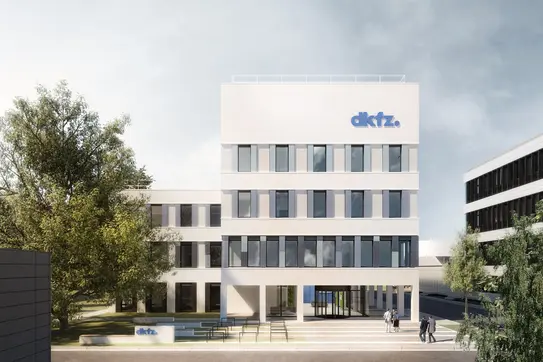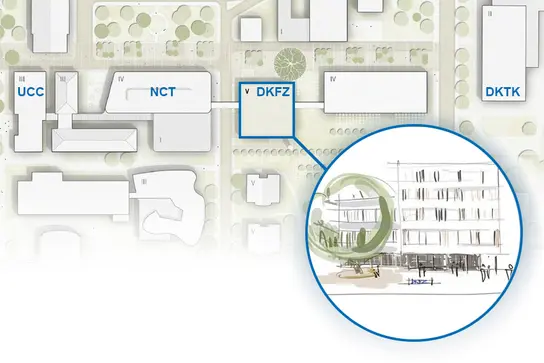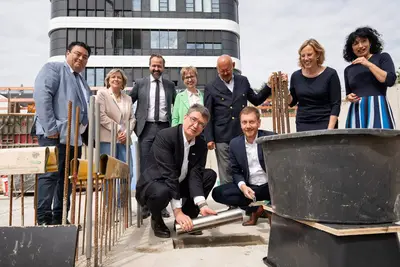DKFZ Site Dresden
Embedded within the oncology campus of Dresden's University Medical Center, the first satellite site of the German Cancer Research Center (DKFZ) focuses on developing technology-driven approaches for the diagnosis, treatment, and prevention of cancer.

Interdisciplinary research and visionary approaches in the fight against cancer

The DKFZ Dresden site is a center for innovative basic research in the fight against cancer. Using smart technologies, robotics, artificial intelligence (AI), and data science, groundbreaking therapeutic approaches are being developed here. Interdisciplinary collaboration is key: scientists from biology, chemistry, computer science, materials science, and other disciplines work hand in hand to create new approaches to the diagnosis, prevention, and treatment of cancer.
Currently, the site is temporarily located at Blasewitzer Straße 80 in Dresden. The office spaces provide a flexible working environment, while laboratories at the University Medical Center Dresden are utilized. This infrastructure is supported by close collaboration with the National Center for Tumor Diseases (NCT) and the University Medical Center Dresden.
The Cancer Information Service (KID) is already operating within the interim facilities, offering reliable, evidence-based information on cancer to provide patients and the public with access to scientifically validated resources.
A state-of-the-art research building, funded by the Free State of Saxony, is being constructed in close proximity to the University Hospital and the Faculty of Medicine Dresden. The new facility, located at Mildred-Scheel-Straße 12, will be completed in two phases: phase one will include five floors and is expected to be completed by 2027, while phase two is scheduled for completion by 2029.
Once completed, the building will be seamlessly integrated into the oncology campus, situated among renowned institutions such as the National Center for Tumor Diseases/University Cancer Center (NCT/UCC), the German Cancer Consortium (DKTK), the National Center for Radiation Research in Oncology (OncoRay), and the Department of Radiation Therapy.
This positions the DKFZ Dresden site perfectly to advance the development of innovative technological methods for personalized, risk-adapted cancer prevention and early detection, which will be validated on-site. A dedicated prevention research group from the National Cancer Prevention Center will be established at the site. The National Cancer Prevention Center is being developed through a strategic partnership between the DKFZ and the German Cancer Aid. Following the Heidelberg model, Dresden will also feature a prevention research outpatient clinic to test the smart, mobile technologies developed here and scale them up for broader use. For more information on the National Cancer Prevention Center, visit the link.
In addition, the Cancer Information Service will serve as a central point of contact for visitors and patients, and the BioBank Dresden will also be housed in the new building.
The building's extensive glass façade and arcade zone will emphasize the openness and transparency of the site. The facilities will welcome visitors who wish to learn more about cancer, placing a strong focus on public engagement and the communication of scientific insights.
Milestones on the way to the new location
The construction of the new building is progressing rapidly. By early 2025, the structural framework for the first phase is almost complete, with a total of four floors already standing.

On July 23, 2024, the foundation stone for the new building of the Dresden site of the German Cancer Research Center (DKFZ) was laid in the presence of Prime Minister Michael Kretschmer. The new building for the DKFZ branch is being financed by the Free State of Saxony with 20 million euros. Read more about it in the press release.

Learn more in the press release about the groundbreaking ceremony for the new building of the DKFZ Dresden site on December 7, 2022. Prime Minister Michael Kretschmer also participated in this symbolic event.

The declaration of intent for the first branch of the German Cancer Research Center in Dresden, dedicated to developing new intelligent technologies in the fight against cancer, was signed. Read more in the press release from July 29, 2019.
Mission Possible - The Vision for the Research Building
State-of-the-art infrastructure and high-tech laboratories
Prevention research outpatient clinic as part of the National Cancer Prevention Center (in collaboration with the German Cancer Aid), featuring a central information hub and exhibition space for visitors
Functional meeting and seminar rooms for employees and public events
Future-oriented workspaces with offices, quiet “thinking” areas, and communication zones to foster scientific exchange
BioBank Dresden, in collaboration with the Faculty of Medicine at the Technical University of Dresden, the University Hospital Carl Gustav Carus Dresden, and the German Cancer Research Center
Get in touch with us

Peggy Koerner
Administrative CoordinatorPostal address:
